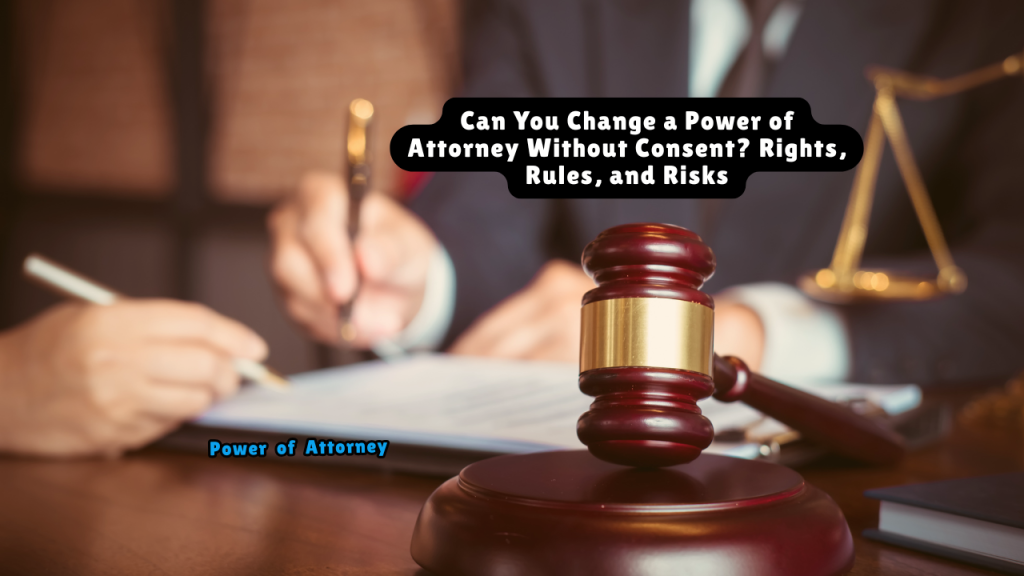Can You Change a Power of Attorney Without Consent? Rights, Rules, and Risks
Yes, a principal (the person who created the Power of Attorney) can change or revoke a Power of Attorney (POA) at any time without the agent’s consent, as long as they are mentally competent. However, formal steps—like written revocation and notifying all parties—are required to enforce the change. An agent cannot block this process, but disputes may arise if proper procedures are ignored.
Table of Contents
When Can a Principal Change a POA Without Consent?
1. The Principal Is Mentally Competent
Under U.S. law, a principal retains the exclusive right to revoke or amend a POA as long as they:
- Understand the nature and consequences of the POA.
- Can communicate their wishes clearly.
Example:
A grandmother revokes her son’s POA after he mismanages her funds, appointing her daughter instead—no consent from the son is required.
2. The POA Is Revocable
Most POAs are revocable by default. Exceptions include:
- Irrevocable POAs: Rare and usually tied to specific financial agreements (e.g., securing a loan).
- Springing POAs: Activated only under predefined conditions (e.g., incapacity).
Legal Reference:
Uniform Power of Attorney Act (§110) states principals may revoke a POA unless it is expressly made irrevocable.
How to Legally Change or Revoke a POA
1. Draft a Revocation Letter
Include:
- “I, [Your Name], hereby revoke the Power of Attorney dated [Date] appointing [Agent’s Name].”
- Your signature, date, and notarization (required in most states).
2. Create a New POA (Optional)
A new POA automatically revokes prior ones in many states if it:
- Clearly states it replaces all previous POAs.
- Is properly executed (signed, witnessed, and notarized).
3. Notify Key Parties
- The Former Agent: Send the revocation letter via certified mail.
- Banks, Doctors, and Institutions: Provide copies of the revocation and new POA.
- County Recorder (if applicable): File the revocation for property-related POAs.
Subject-Object-Predicate Example:
“The principal terminates the agent’s authority by signing a revocation letter and notifying the bank.”
What Happens If the Agent Refuses to Cooperate?
Even without consent, the agent’s authority ends upon revocation. However:
- Unauthorized Acts: The agent could face lawsuits or criminal charges for continuing to act.
- Institutional Pushback: Banks may require proof of revocation (e.g., notarized letter) to freeze the agent’s access.
Real-Life Example:
In Estate of Collins v. Davis (Texas, 2021), a daughter continued using a revoked POA to withdraw funds. The court ordered her to repay $45,000 and charged her with fraud.
Related article:
Can a Power of Attorney Change Ownership of Property?

When Consent Is Required
Consent from the agent or others may be needed in rare cases:
- Irrevocable POA: Requires a court order or agreement from all parties involved.
- Joint Agents: If the POA requires co-agents to act together, removing one may require the other’s cooperation.
Red Flags and Risks
- Undue Influence: Family members coercing a principal to change a POA.
- Forged Documents: Fake revocations or POAs created under duress.
- Incomplete Notification: Failing to inform institutions leaves the old agent’s authority intact.
Quote from a Legal Expert:
“Revoking a POA is simple in theory but messy in practice. Always notify every institution—otherwise, the agent might still act.”
— Mark Thompson, Elder Law Attorney (Cited in AARP Bulletin, 2023).
State-Specific Rules
| State | Key Requirements |
| California | Revocations must be in writing and notarized (CA Probate Code §4151). |
| Florida | Notarization required; file revocation with the county if the POA was recorded. |
| New York | Oral revocation is valid but hard to enforce without written proof. |
Government Resources:
FAQs
Can I remove an agent without telling them?
Legally, yes—but notifying them in writing is critical to avoid liability for their future actions.
What if the agent ignores the revocation?
Report them to Adult Protective Services or file a restraining order for financial abuse.
Can a nursing home force me to keep an agent?
No. Federal law prohibits facilities from interfering with POA changes (42 CFR §483.10).
How to prove a POA was revoked?
Use a notarized revocation letter and keep certified mail receipts as evidence.
Key Takeaways
- Principals can revoke or change a POA without consent if mentally competent.
- Written revocation + notification is essential to enforce the change.
- Old agents acting post-revocation risk legal penalties.
Bottom Line: You hold the power to change your POA—no one else’s permission is needed. Protect yourself by following formal procedures and consulting an attorney for complex cases.
Checklist for Changing a POA
- Draft and notarize a revocation letter.
- Create a new POA (if required) with updated terms.
- Notify the former agent via certified mail.
- Send revocation copies to banks, doctors, and agencies.
- File with the county recorder if the POA involved property.
Need Help?
- Legal Aid Services: Free Assistance
- National Academy of Elder Law Attorneys: Find a Lawyer
About the Author

Sarah Klein, JD, is an experienced estate planning attorney who has helped clients with wills, trusts, powers of attorney, and probate matters. At All About Lawyer, she simplifies complex estate laws so families can protect their assets, plan ahead, and avoid legal headaches during life’s most sensitive moments.
Read more about Sarah
